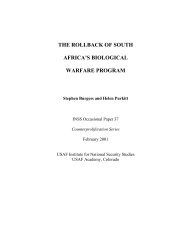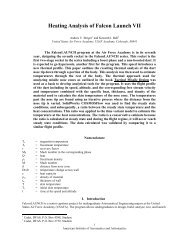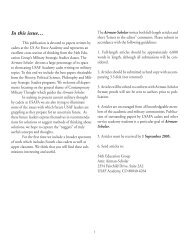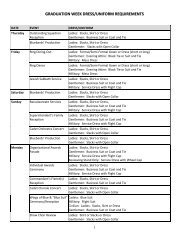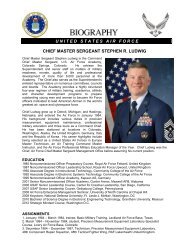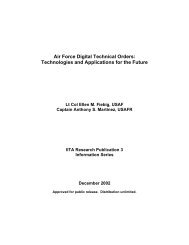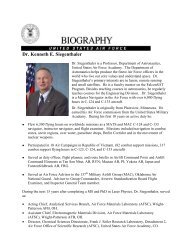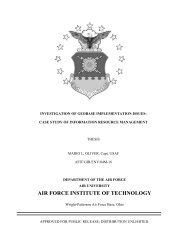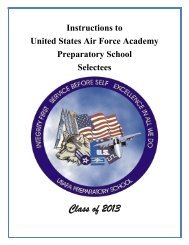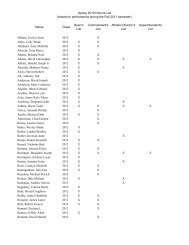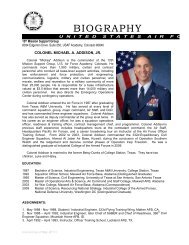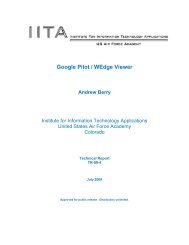Military Professionalism - United States Air Force Academy
Military Professionalism - United States Air Force Academy
Military Professionalism - United States Air Force Academy
You also want an ePaper? Increase the reach of your titles
YUMPU automatically turns print PDFs into web optimized ePapers that Google loves.
Wardynski, Casey, David S. Lyle, and Michael J. Colarusso. Towards a U.S. Army<br />
Officer Corps Strategy for Success: Developing Talent. Carlisle Barracks: U.S.<br />
Army War College, Strategic Studies Institute, May 5, 2010.<br />
http://handle.dtic.mil/100.2/ADA516783<br />
Developing leaders through experience, formal training, and education is a long-standing<br />
hallmark of the U.S. Army. Maintaining its excellence as a developmental organization<br />
requires vigilance, however. Authorized strength and inventory mismatches, an inverse<br />
relationship between responsibility and formal developmental time, and sparse<br />
nonoperational development opportunities are serious challenges the Army must address.<br />
Doing so requires a talent development strategy firmly rooted in human capital theory.<br />
Such a strategy will recognize the value of continuing higher education, genuinely useful<br />
evaluations, and the signals associated with professional credentials.<br />
Wardynski, Casey, David S. Lyle, and Michael J. Colarusso. Towards a U.S. Army<br />
Officer Corps Strategy for Success: Employing Talent.” Carlisle Barracks: U.S.<br />
Army War College, Strategic Studies Institute, May 5, 2010.<br />
http://handle.dtic.mil/100.2/ADA519580<br />
Efficient talent employment is at the core of the Army Officer Human Capital Model,<br />
which is based on assessment, development, retention, and employment. However, the<br />
Army’s current employment paradigm is unequal to the needs of a professional volunteer<br />
Army facing the twin challenges of a competitive labor market and an increasingly<br />
complex global operating environment. It unduly prioritizes "fairness" when making<br />
assignments, has a narrowly defined pathway to senior leadership ranks, cannot see the<br />
talent it possesses, and suffers from severe principal-agent problems. Optimal<br />
employment theories, information age tools, and well-regulated market mechanisms can<br />
help the Army match individual officer talents against specific work requirements,<br />
reducing risk and achieving the depth and breadth of talent it needs, both now and in the<br />
future.<br />
Wouk, Herman. “Sadness and Hope: Some Thoughts on Modern Warfare.” The<br />
Naval War College Review 51.1 (Winter 1998): 123-132.<br />
Warfare is the ultimate extension of conflict politics, and sadness is the present reality.<br />
Wouk expresses his sadness at the historic trap the world is in and the hope that mankind<br />
will yet find its way to the light.<br />
28




